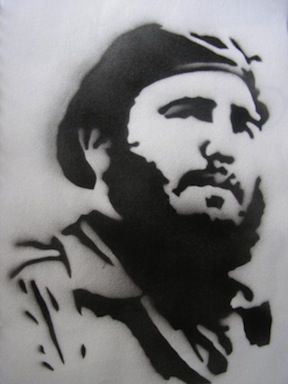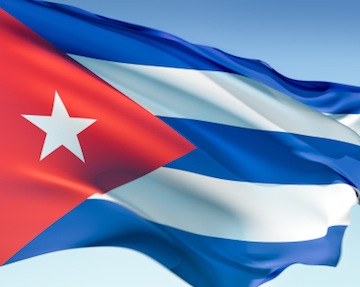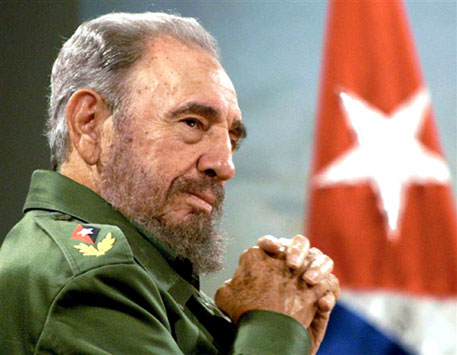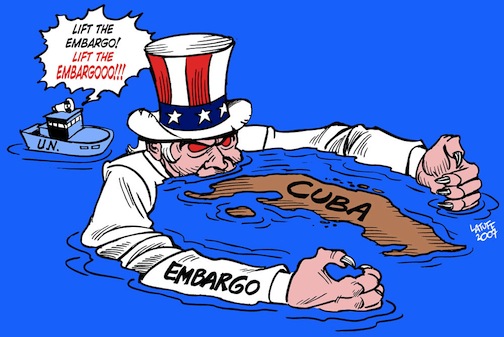|
“[This death] … is a hard blow, it is a tremendous
blow to the revolutionary movement because, without any doubt, it deprives it
of its most experienced and capable chief. But they who sing victory are
mistaken. They are mistaken who believe that his death is the defeat of his
ideas …”
Eulogy for Che Guevara
Fidel Castro Ruz, October 1967
Castro’s
words on the death of his friend and comrade can just as easily apply to Fidel
himself.
When
you visited Cuba, you knew you were in the presence of something great. Here
was a smallish nation, in the shadow of and a direct line of fire from, the
world’s superpower, proudly doing its own thing. Partly by choice, partly through
necessity.
For
all its shortcomings – and there are many – this is a country that built
itself, on its own terms, and with its own vision of what decency and caring
for humanity really means.
In
1956, no one could have dreamed that Cuba would become what it is today.
In
1959, no one foresaw the heavy weights that would be placed on the shoulders of
Cubans who believed their country belonged to them, and that it was not simply
a casino and brothel for the wealthy class of the United States. They didn’t
anticipate the churlishness of Dwight Eisenhower and his vice-presidential hand
puppet, Richard Nixon.
In
1961, an excursion straight out of a Monty Python skit made the United States
look like a group of inept fools. No one might have guessed the petulant
blockade that would follow would still be in place more than fifty years later.
In
1962, the world teetered as two men of immense personal strength and ego tested wills
in a game of chicken over this small island. The bombs were dismantled, and the
moment passed; but the world knew that someone had blinked. It is generally wrong about who that was.
In
1967, one of the romantic heroes behind the freeing of this country from
capitalist clutches was killed trying to bring about similar changes elsewhere.
And although there are those who see Che Guevara today as nothing more than the
patron saint of t-shirts, people with a sense of history and a genuine desire
for the betterment of mankind still honour the man eulogized by his dear friends.
In
1989, with the demise of the Soviet Union imminent, no one gave Cuba a chance of
surviving. But it reinvented ways of delivering to its people those
necessities of life that they have come to believe are birthrights.
In
2016, accolades and criticisms have begun to pour in for the man who was there
through all of this, and without whom this world would be a much poorer place.
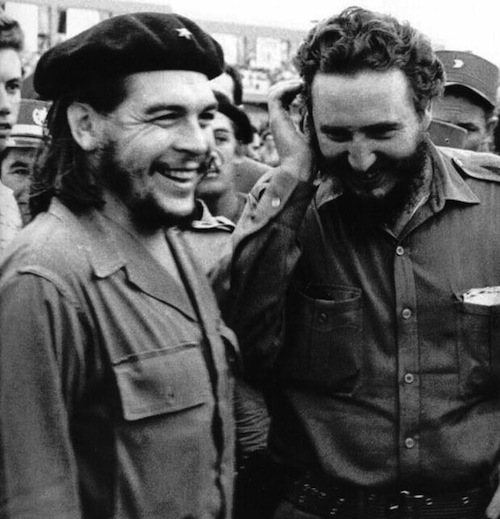 |
| Fidel & Che in happier times
|
Background
Fidel
Castro Ruz (1926-2016) was a giant of his time. Reviled by much of the world,
and even by some of his fellow countrymen, a sober analysis of his impact can’t
fail to see that Cuba, and Latin America, are better for having known him.
He
was born Fidel Alejandro Castro Ruz, near Birán in Oriente province Cuba, the
third of six children: two brothers, Raul and Ramon, and four sisters,
Antelita, Juanita, Emma, and Augustina. His father, Angel, was a wealthy sugar
plantation owner, born in Spain; his mother, Lina Ruz Gonzalez, had been a maid
to Angel's first wife at the time of Fidel's birth. By the time Fidel was 15, the
first marriage was over and Angel wedded Fidel's mother. His father formally
recognized Fidel at the age of 17, and his name was changed from Ruz to Castro.
Fidel was educated in private Jesuit boarding schools,
growing up with a life of privilege among the poor of Cuba. Although he was
apparently gifted academically, he was initially interested only in sports –
particularly baseball. Still, in 1945, he entered law school at the University
of Havana and soon immersed himself in the heady climate of Cuban nationalism,
socialism, and anti-imperialism. For a Cuban, by default, anti-imperialist
meant anti-American.
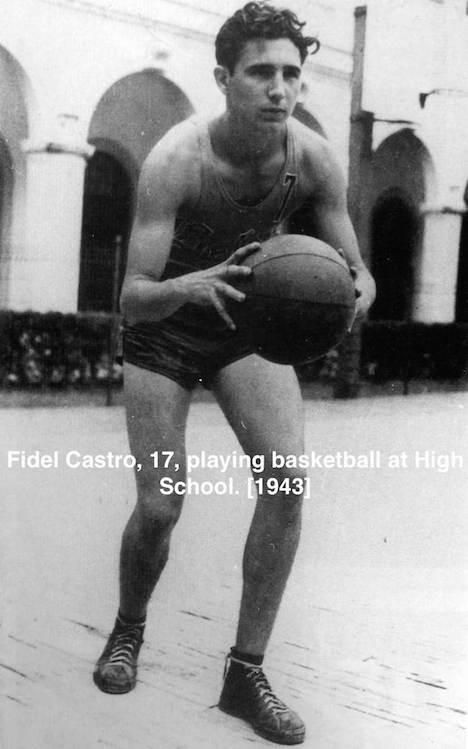 |
| Fidel in high school, 1943 |
In 1947, having become passionately interested in
social justice, he travelled to the Dominican Republic to join an expedition
attempting to aid in the overthrow of the dictator Rafael Trujillo. Although
the coup fizzled almost as soon as it started, Fidel’s enthusiasm for reform
was only strengthened.
In one of the odd twists of fate, Castro returned to
the University and joined the Partido Ortodoxo, an anti-communist party. It had
been founded for the purpose of reforming corruption in Cuban politics.
By 1948, Fidel was married to Mirta Diaz Balart,
daughter of a wealthy Cuban family. Along with their child, Fidelito, the
Castros were exposed to a wealthy lifestyle and political connections. He stood
for election to the Cuban parliament, but a coup led by General Fulgencio Batista
overthrew the government and cancelled the upcoming elections. Fidel soon found
himself without a political platform, and with little money to support his
family (the marriage finally came to an end in 1955).
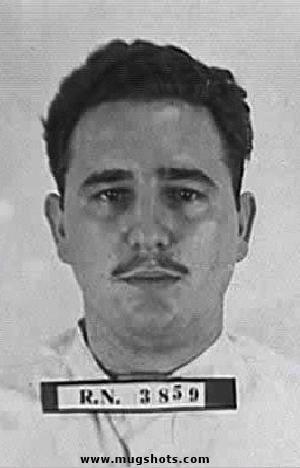 |
| Imprisoned and released by Batista
|
But in 1953, Fidel, along with a group of about 150 Ortodoxo
members – who had fully expected to win the 1952 general elections – joined
together in an attempt to overthrow Batista with an attack on the Moncada
military barracks. Like the half-baked Bay of Pigs exercise that was still years
in the future, this attack was a failure before it started. Castro was
captured, and sentenced to 15 years in prison.
In one of history’s biggest mistakes, Batista granted
an amnesty to Castro in 1955. Fidel journeyed to Mexico and came into the
company of the Argentinian physician, Ernesto ‘Che’ Guevara. Fidel was soon convinced that
Che’s belief in armed insurrection was the only way to reform Cuba, and he
readily accepted Guevara’s offer to join him against Batista. On December 2,
1956, Fidel and his group tried again, this time with an assault on Manzanillo.
It is unclear whether he and his group really expected success with a
contingent of only 81 insurrectionists; if they did, they were sorely
disappointed.
Fidel and brother Raúl managed to escape into the
Sierra Madre, along with Che. From there, the group spent two years organizing
resistance and staging sorties against the government. Astonishingly, they even
managed to form something of a parallel government and institute some agrarian
reforms – mainly by organizing locals to take over land and manufacturing.
Batista’s forces seemed powerless, even with US assistance, to deter what was,
by now, a widespread popular reform initiative.
Coming to Power
Beginning in 1958, Fidel and his group took off the
gloves and began a series of military initiatives throughout the island. His
troops began to capture large chunks of the country and the popular movement
soon resulted in a wave of defections by Batista’s troops, causing the general
to flee to the Dominican Republic. With Batista’s government collapsed, Fidel
and his band of heroes marched into Havana in January 1959. An interim
government led by Jose Miro Cardona was sworn in; but in just a few weeks,
Cardona resigned and Castro was sworn in as prime minister.
Castro soon began wide-ranging reforms, which included
nationalizing factories and plantations. This move was intended to help end US
economic dominance on the island, but the US saw this only in a negative light,
causing friction between Cuba and the United States. Cuba declared that it
would compensate foreign companies, using the artificially low property values
that the companies themselves had negotiated with past Cuban governments in
order to keep their taxes low. This did not sit well with US corporations who suddenly thought their companies were much more valuable than they had been pretending.
At the time, Castro denied repeatedly that he was a communist
– remember, his Partido Ortodoxo was anti-communist – but many Americans thought
his policies looked like a Soviet-style control of the economy and government.
In April 1959, Castro visited the United States as a guest of the National
Press Club. President Dwight Eisenhower, however, refused to meet with him. It
is believed this snub, coupled with offers of assistance from the Soviet Union,
may have turned Castro from an ardent anti-communist, to a fervent socialist.
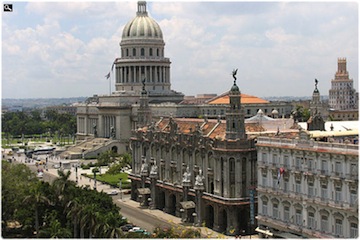 |
| La Habana
|
The US response to Cuba, which caused Fidel to lean
even more heavily on assistance and advice from the USSR, was provoked even
further by the US. In 1960, Cuba signed an agreement to purchase oil from the
Soviets, but the US-owned refineries on the island refused to process the oil.
So Castro expropriated them. The US retaliated by cutting sugar imports.
Bay of Pigs
On January 3, 1961, outgoing president Dwight
Eisenhower broke off diplomatic relations with Cuba. On April 16, Fidel formally
declared Cuba a socialist state. The following day, 1,400 Cuban exiles invaded
Cuba at Bahía de Cochinos (Bay of Pigs) in an attempt to overthrow the Castro
government. It was an unqualified disaster. Hundreds of the insurgents were
killed and nearly 1,000 captured. The US denied involvement, but it soon became
clear the exiles were trained by the Central Intelligence Agency and armed by
the US. Years later, declassified material revealed the US had begun planning
an overthrow of Cuba as early as October 1959.
Although the Bay of Pigs invasion was conceived and
planned during the Eisenhower years, his successor, John Kennedy, gave it a
green light. What he refused to do, however, was grant the excursion any cover
from the US air force. There was nothing practical or humanitarian about this –
Kennedy was hoping to hide US involvement in the invasion. But that decision
did help to condemn the exercise to failure.
On May 1, Castro announced an end to democratic
elections in Cuba and denounced American imperialism. At the end of 1961, he declared
himself a Marxist-Leninist and stated that Cuba was adopting communist economic
and political policies. On February 7, 1962, the United States imposed a full
economic embargo on Cuba, a policy that continues more than 50 years later with a degree
of petulance that is almost laughable.
Missile Crisis
In October 1962, Castro’s increasing reliance on
Soviet aid brought the world to the brink of nuclear war. In an effort to deter
another US invasion of Cuba, Soviet Premier Nikita Khrushchev arranged for the
placement of nuclear missiles in Cuba. Although he was clear that deterrence
was on his mind, Khrushchev justified the move as a response to American
missiles deployed in Turkey and pointed at Moscow.
Eventually, after many tense days, the world stood
down and fingers were removed from the nuclear buttons. The Cuban missiles
were dismantled, and the US missiles were removed from Turkey. In the West, this
is seen as a victory for Kennedy; elsewhere, it is recognized as a clever
strategy by Khrushchev who, even at home, had generally been considered to be a
buffoon.
It was a tense standoff between the two nuclear powers
that ultimately left Castro embarrassed. He was marginalized throughout the
crisis, and left out of the negotiations entirely. Worse, the US managed to
convince the Organization of American States that Cuba’s part in this
misadventure should result in the OAS ending diplomatic relations with Cuba.
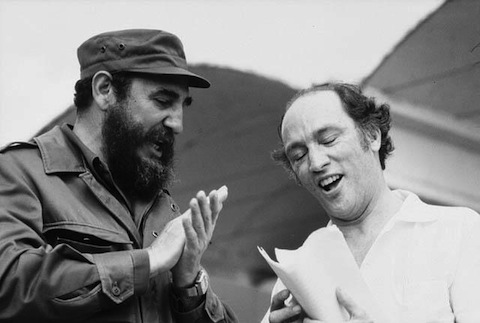 |
| Fidel & Canada's prime minister Pierre Trudeau. Fidel attended Trudeau's funeral in 2000, seated beside former US president Jimmy Carter
|
But Castro didn’t feel shame for long. In 1965, he
merged the Communist Party with his revolutionary organizations and installed himself
as head of the party. From that point onward, Fidel began a campaign of
supporting armed struggle against imperialism in Latin American and African countries.
By the 1970s, he was standing forward as the leading spokesperson for Third
World countries and providing military support to pro-Soviet forces in Angola,
Ethiopia, and Yemen. But despite heavy subsidization by the USSR, those Third
World efforts were largely unsuccessful and put a strain on the Cuban economy.
The US agreement that had ended the Missile Crisis –
not to invade Cuba - didn't prevent American ambitions of destroying Cuba in
other ways. Castro was the target of CIA assassination attempts over the years,
638 in all, according to Cuban intelligence. These ranged from exploding
cigars, to a fungus-infected scuba diving suit, to mafia-style shootings, among
others. Fidel took great delight in the fact that none of the attempts succeeded,
and frequently bragged about them. He was reported as saying that if avoiding attempted
assassination was an Olympic event, he would have many gold medals.
Since the revolution, many Cubans have fled Castro's
rule, mostly settling in Miami. The largest of these exodus movements occurred
in 1980 when Castro opened up the port of Mariel to allow exiled Cubans living
in Miami to come claim their relatives. Castro also loaded the ships with Cuban
prison inmates, mental patients, and other social undesirables. In all, about 120,000
Cubans have left their homeland for sanctuary in the United States.
Post-USSR
After the 1991 collapse of the Soviet Union sent
Cuba's economy into a tailspin, Castro's revolution began to lose momentum.
Without cheap oil imports and an eager Soviet market for Cuban sugar and a few
other goods, Cuban unemployment and inflation grew. The contraction of the
Cuban economy resulted in 85 percent of its markets disappearing.
Yet Castro was very adept at keeping control of the
government during those difficult economic times. He pressed the United States
to lift the economic embargo, but it refused. So he adopted a quasi-free market
economy and encouraged international investment. He legalized the US dollar and
encouraged tourism, currently the greatest source of foreign income. Fidel also
visited the US in 1996 and invited Cuban exiles to return to Cuba to start
businesses.
Ill Health
In the late 1990s, Castro's advancing age started to
lead to speculation abroad – and probably at home – about his well-being.
Although health problems have been reported or rumoured over the years, the
most significant event was surgery for gastrointestinal bleeding in July 2006.
In a dramatic announcement, Castro designated his brother Raúl as the country's
temporary leader. Raúl had served as Fidel's second in command for decades, and
was officially selected in 1997 to be his successor. Although Fidel’s recovery
was prolonged, it appears the surgery was successful. Still, he could not run
away from time.
In February 2008, the now 81-year-old Fidel
permanently gave up the Cuban presidency. He handed over power to his 76-year-old
brother and the Cuban National Assembly officially elected Raúl Castro as
president of Cuba the same month, although Fidel retained his position as First
Secretary of the Communist Party. By April 2011, even that title was relinquished
- and Cuba was no longer Fidel.
In an article appearing on the Cuban government
website at the time, Fidel wrote that, "Raúl knew that at this time I
wouldn't accept any role in the party." He added that it is time for
younger party members to work on the country's economic system. "The new
generation is being called upon to rectify and change without hesitation everything
that should be rectified and changed," he wrote. In short, Fidel accepted
that not everything was perfect and he was comfortable with new people and new
ideas that would shore up the weaknesses.
Legacy
Now that Fidel has left us in body – has reached what
the US government euphemistically called “the biological solution” (having
failed so many times at less pleasant solutions) – it is time to realistically
evaluate the revolution’s successes and failures.
Even the most stalwart defenders of Castro and his
revolution would admit the legacy of Fidel is not perfect. To be sure, there have
been some instances where popular expression was oppressed. There have been
economic hardships, although it is entirely accurate to say much of this derives
from having a large swath of the world refuse to engage in trade with Cuba (at the behest of the US).
Boatloads of disaffected (or delusional) Cubans sailed off to Florida where a
few excelled, more became thugs and criminals, and the vast majority realized
the American Dream was just that – a dream, and you really need to be asleep to
believe it.
But Cuba is no North Korea. Although it is said by many abroad that Fidel has a huge ego and the
government revolves around him, it would do us well to remember that regardless
of the system or form of government, that is true almost everywhere. Cuba’s is
not a perfect system, but it is probably the only system that could have lifted
Cuba from its pre-revolutionary status as a brothel for rich Americans.
Fidel has delivered on many of the promises of his
revolution.
Cuba has a long history of domination by Spain, and
then the US, with a very short not-so-democratic period before Batista.
Although it can be reasonably argued that the system under Castro is not
democratic, he has nevertheless provided a society virtually free of racial
strife, with full medical and educational benefits for the people, with low infant
mortality and high life expectancy.
Castro's regime has been credited with opening more
than 10,000 new schools and increasing literacy to nearly 100 percent. Cubans
enjoy a universal health care system, which has decreased infant mortality to levels
not seen even in most First World nations - it is lower even than advanced countries like the US and Canada. Today, Cuba’s healthcare system is
so advanced that there is a thriving ‘medical tourism’ to the island from
foreign patients seeking good, effective, and inexpensive medical care.
Cuba is also now a net exporter of medical care. It has
twice as many physicians per capita as the United States, and its people are
able to access medical services and drugs at no, or very minimal, cost.
Capitalists might argue that this undervalues the physicians, but it is hard to
see how it does not benefit society as a whole. The Cuban medical system,
considered one of the world’s best, is delivered at an annual cost of less than
$400 per capita, compared to more than $6,000 in the US.
Cuba also donates medical expertise around the world,
especially in impoverished areas or disaster zones. Frequently, Cuban medical
personnel show up in earthquake and flood zones, usually without fanfare and
usually without any acknowledgement from the mainstream media of the West (note that when the Ebola outbreak of 2014 hit western Africa, the Cubans were there - this time, even some in the Western press acknowledged the Cuban sacrifice). They
even offer free medical training for students from disadvantaged areas of the
United States (and there are many of those, ‘American Dream’ notwithstanding),
provided they agree to return home and work in low-income neighbourhoods. While
the anti-socialists condemn this program, the mostly non-white female
Americans who benefit from this chance to learn and practice medicine are
grateful, and Cubans are justifiably proud of their contribution.
Pre-revolutionary
Cuba was rife with privilege for
whites or descendants of the Spaniards, and so they were the ones who
left during the waves of immigration. But now there is a level of race
and gender
equality in Cuba that is rare in the world. Fidel’s principle of equal
pay and
equal opportunity is woven throughout the social fabric of the island so
that
people of almost any skin shade and both sexes are liable to be found
doing
almost any job or holding almost any position.
By North American standards, most Cubans don’t live in
fancy places. But no one is homeless. If, as frequently happens, homes are lost
to hurricanes, the government rebuilds at no cost to the survivors. And, as a
mark of superb social planning, it is very rare for Cubans to be killed during
these annual storms - the 2005 and 2012 onslaught of Hurricanes Dennis and Sandy were stark reminders of the humbling power of Nature. The early warning and protection system leaps into action
and people head for designated shelters. Try comparing that to any other country,
including the wealthiest, where people survive, or not, based on their own wits and luck.
One of the country’s finest achievements is its environmental
progress. Much of this has been driven by necessity, but Cuba is the only
country in the world to have converted entirely to organic agriculture. And it
did this in fewer than 10 years after the collapse of the Soviet Union ended
financial assistance to the island.
During this rebuilding period, when $4-$6 billion in annual funding vanished, Castro implemented a program known as the ‘Special
Period in Time of Peace’. This essentially meant enduring wartime scarcities
without the war. But in less than a decade, food crops were developed without
the need for significant chemical inputs or heavy machinery, unused land was
converted to growing food, a program of urban agriculture was implemented to
supplement the farmers.
By 1999, the Grupo de Agricultura Organica that
spearheaded the conversion was given the Right Livelihood Award – recognized
worldwide as the “alternative Nobel”.
When the loss of Soviet assistance made gasoline a
rare commodity, Castro purchased or built bicycles. Even today, these are
plentiful on Cuban roads, leading to a lower transportation cost, healthier
citizens, and cleaner air. Even as gasoline has become more plentiful (thanks
in large part to trade with Venezuela), the law requires that drivers pick up
hitchhikers and carry as many people as the vehicle will hold.
Cuba's system has obvious flaws, obvious even to them. And they are experimenting with changes that will improve the lives of the people while holding true to the socialist paradigm.
But in considering
whether the people as a whole are better off since Castro, it would be hard to
reach a conclusion that Batista and his ilk would be preferable. Many charges leveled
against Fidel by the West – suppression of dissent, torture of enemies,
dealings with bad actors on the world scene – are exaggerated and distortions
of the truth, or even manufactured lies. But even if true, there are few world leaders about whom the same
could not be said.
It is true that Cubans didn’t enjoy freedom to travel abroad
under Fidel, but one could argue everyone’s labour was needed and the fear of
losing people en masse offered some justification for that policy. Still, it
has been revised and there is now more ability for Cubans to travel.
But the thawing of relations continues. Cuba has no illusions that the US has suddenly become decent and honourable - they know better. But there are some changes already in place and more to come that will benefit Cuba. It is hard to believe the US is looking for anything other than another vassal state.
There has never been any groundswell movement in Cuba
to reject Castro’s revolution. Surely there are some who are not happy; but the
majority appears to believe Cuba is much better off now than before Fidel. Some
might argue that an uprising is virtually impossible with Castro’s tight
control; but how would they explain, then, the overthrow of the US-supported
Batista with a mere 180 men? A popular revolt has not taken place because,
well, the idea isn’t popular.
It is hard to deny the almost 100% level of literacy,
greater even than most First World nations. Castro opened thousands of schools,
and even now the lowest peasant gets education no matter how far he or she
lives from a local school. If they can’t come to the school, the school comes
to them.
Perhaps
the greatest Castro legacy is the object lesson that a small band of very
determined people could overthrow a government supported by the world’s greatest
bully, and then maintain power in the face of both military and economic
calumny from that same bully. For more than half a century.
If
nothing else, Fidel Castro Ruz serves as a beacon to all those nations and
peoples who believe they are at least as important to this planet as the Americans
of the United States.
Epilogue:
The world was caught off guard by the December 18, 2014 announcement from Washington and Havana of a new era in relations between the US and Cuba. Both Presidents Barack Obama and Raúl Castro took the opportunity to thank Canada for mediating secret talks between the two nations that had occurred over the previous 18 months or so. [Canada was a reasonable choice as convener since it is friends with both of them.]
Most commentators seemed to think this was a good thing, and a measure long overdue. While there are at least a few members of US Congress who had a problem with the agreement (and no doubt Raúl Castro had similar gripes from his government), there was also wide ranging opinion about the value of the agreement and, more importantly, who won and who lost.
There were some in the US who characterized Obama as a sell-out and who noted it would still take an act of Congress for the US embargo on Cuba to be lifted. And there were those who believe the deal was a slap in the face to various others: to Russia; to ALBA; to Mercosur, and so on - a slap by Cuba.
Commenting
on the apparent thaw, Fidel cautiously welcomed it but was clear that
he remains suspicious of American intent. Through long experience, he
learned that the US is not to be trusted - a lesson many other nations
overlooked at their peril.
Whatever reasons the two countries might have had for heading down this path at this time (or, rather, starting down it 18 months earlier), it was sure to take some time before it can be said with clarity whether either side gained or lost anything.
Cuba stated clearly that its expectation was for the US to respect the government of Cuba and to refrain from interfering in Cuban society. For its part, the US quickly divided into camps. Capitalists began to salivate over a new market, with cheap labour; Cuban exiles began either to dream of a return home, or were rabidly opposed to this rapprochement so long as either Castro brother remained alive; President Obama's political opponents objected because, well, that's what they always do.
And then Obama shot himself in the foot. On March 9, 2015, he decided to declare - beyond any sensible reasoning - that Venezuela represented an imminent risk to US national security. Where that came from is speculative, but Cuba was quick to argue that Obama's move was nonsense, to condemn it outright, and to hint that any deal involving the US and Cuba might revolve around the US keeping its grubby mitts off Venezuela.
Cuba and Venezuela are allies and both members of several Latin American coalitions. But perhaps even more importantly, Castro might be speculating that he was being misled - that the US wasn't trying to eliminate its embargo, they simply wanted to transfer it to a new contender.
Nevertheless, talks and trade visits continued, embassies opened - but still no lifting of the embargo. Raúl indicated he would retire at the end of his current term and his successor will have to navigate what is sure to be an exercise in arm-twisting and deceit from the US. In the end, it seems likely that Fidel's skepticism about the US overtures was well placed.
Obama then became the first sitting US president to visit Cuba in more than 50 years, in March 2016. He spent a couple of days, some of it undoubtedly uncomfortable for him. For despite his 'friendly' hints at 'human rights abuses' in Cuba, it was made clear to him that he was not persuading the government. It was also made clear to him that the US is on very shaky ground criticizing any other country's 'human rights'.
Obama's host (Raúl Castro) stated in public that Cuba welcomed the visit and that better relations with the US was in everyone's interest. But he also stated plainly that Cuba has no intention of changing its form of government or its society to suit the US.
Oh yes, and there was still no lifting of the embargo.
Fidel and his revolution were still alive, and still winning.
Paul Richard Harris is an Axis of Logic editor and columnist, based in Canada. He can be reached at paul@axisoflogic.com.
Read the Biography and additional articles by Axis Columnist, Paul Richard Harris
© Copyright 2016 by AxisofLogic.com
This material is available for republication as long as reprints include verbatim copy of the article in its entirety, respecting its integrity. Reprints must cite the author and Axis of Logic as the original source including a "live link" to the article. Thank you!
|

